We may not have the course you’re looking for. If you enquire or give us a call on 01344203999 and speak to our training experts, we may still be able to help with your training requirements.
Training Outcomes Within Your Budget!
We ensure quality, budget-alignment, and timely delivery by our expert instructors.
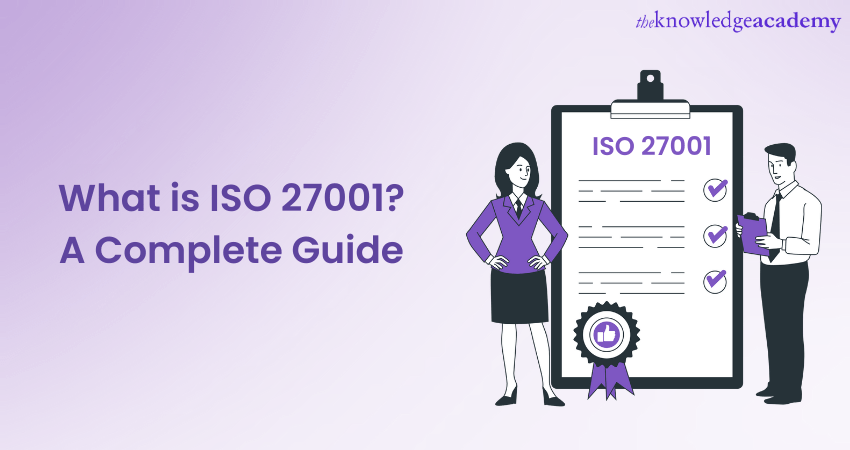
In today's world, data is everything; you can even call it the new gold. Data such as trade secrets and patents are priceless due to their vast potential. This is precisely why they have become the target of malicious actors like hackers. But hope is on the horizon in the form of ISO 27001. But What is ISO 27001? Can it prevent security breaches like hacking? Let's find out.
Every year many organisations become victims of security breaches, and the damage is irreparable in some cases. According to IBM, a data breach costs companies 3.5 million GBP on average. Having an ISO 27001 Certification saves you from such security breaches.
Additionally, it shows your client that you have implemented the best practices for securing information. Read this blog, to learn What is ISO27001, its benefits, importance, and requirements. Also explore, its related international standards.
Table of Contents
1) What is ISO 27001?
2) What is the purpose of ISO 27001?
3) What are the benefits of ISO 27001?
4) Principles of ISO 27001
5) What is Information Security Management Systems (ISMS) and why is it necessary?
6) How does ISO 27001 help your organisation?
7) Requirements of ISO 27001
8) Other Supporting International Standardisation for Organisation (ISO) standards
9) Conclusion
What is ISO 27001?
ISO 27001 is a renowned Information Security Management Systems (ISMS) standard. It primarily focuses on the information security aspect of an organisation. It is a standardised procedure that protects an organisation's confidentiality, integrity and availability. It can effectively protect an organisation's data from actors with malicious intent.
ISO 27001 Physical Security provides a competitive edge to the organisation's security. It is a complete package that gives detailed instructions on creating, applying, maintaining and upgrading the organisation's security. Creating and executing such ISMS can vary based on criteria like:
a) Organisation’s business goals and requirements
b) Security needs
c) Work procedures
d) Organisation's capacity
What is the purpose of ISO 27001?
ISO 27001 issues a framework for protecting the information of the organisation in an organised and less expensive method. It is very versatile, and you can implement it in any organisation regardless of size. By adopting the ISMS method,
Why ISO/IEC 27001 is important?
With an ISO/IEC 27001 Certification, an organisation can showcase its security prowess to its clients, improving its trust and reputation. Besides, in some countries, it may be mandatory to have certain ISO Certifications run a business. It will also give you the foundational knowledge necessary for protecting your data.
Many people now view compliance with a regulatory requirement as fundamental key features of ISO 27001. as necessary when choosing their business partners. It gives a sense of security and ensures the processes and tools are of high-quality, trustworthy, and stable.
Since ISO/IEC 27001 is well-known globally, it could further increase their business potential. Apart from organisations, individuals can also acquire 27001 Certification. To get certified, they must give an exam. Earning this Certification could highlight their ability to audit ISMS, thereby increasing their chances of getting hired.
How does ISO/IEC 27001 works?
The primary goal of ISO 27001 is to protect an organisation's information systems, confidentiality, integrity and availability. ISO 27001 aims to achieve these goals through the following:
a) Assessing the risks: Once implemented, ISO 27001 Information Security will perform a thorough risk assessment throughout the organisation. By conducting a risk assessment, it can detect areas of weakness where security breaches could occur.
b) Mitigating the risks: Once the risk assessment is done, it will help determine what should be done to prevent such security incidents.
So, ISO 27001 Compliance is a very effective process for risk management. It works by finding out where potential risks could come from and eliminating them. Implementing proper security measures will prevent these risks in an organised way.
Signup for our course on ISO 27001 Internal Auditor and learn how to perform internal audits and secure ISMS.
What are the benefits of ISO 27001?
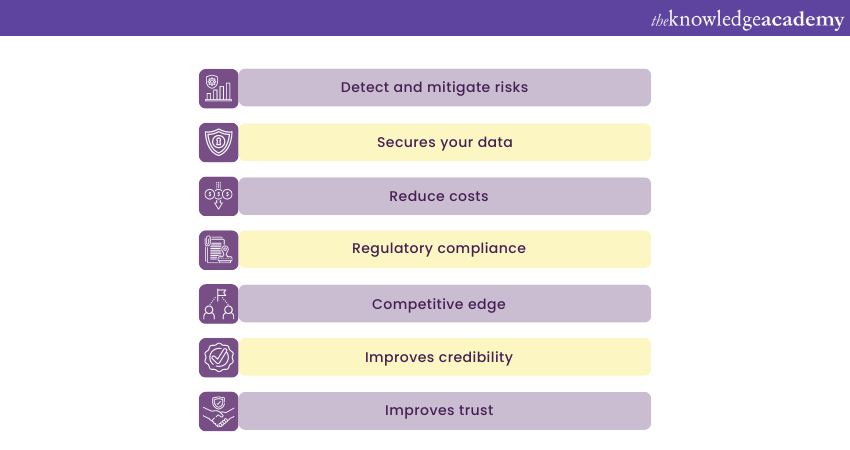
There are many benefits to getting ISO 27001 certified, such as increased security and reduced operating costs. Some benefits of ISO 27001 are listed below:
Mitigate risks
From hacking to malware, there are many risks to an organisation's security, particularly information security. In today's world, data is considered the new gold. The difference, though, is pirates in those days wore eye patches, but pirates these days sit behind a computer screen. If a data breach were to happen in an organisation, its news would spread like wildfire, damaging its reputation. The company will also have to bear the cost of fixing the breach and strengthening the security systems.
So, businesses these days clearly understand the cost of such risks. They are eager to implement a standardised security framework like ISO 27001. It is a powerful ISMS that can fulfil all the information security needs of an organisation. Many institutions, including public organisations, use it to enhance security regardless of size.
Improves trust and reputation
When an organisation's systems are hacked, its survival is seriously jeopardised. Not only does it lead to the leakage of valuable data, but the news about the incident could also seriously hurt its reputation. If an ISO 27001 ISMS is employed, it will help devise an effective plan to deal with such incidents. It regularly conducts risk assessments to identify vulnerabilities and can act early on. So, in many cases, data breaches are prevented in advance.
Humans are emotional beings, and trust is among the biggest factor for many people when choosing a product. An ISO 27001-certified ISMS, through the process of an ISO 27001 Audit, allows organizations to demonstrate the effectiveness of their information security management system. This certification assures stakeholders that the security measures are not taken at face value but are independently verified. This verification enhances trust and confidence, as external parties can assess and validate the implemented security controls, fostering an environment of transparency and continuous improvement in information security.
Easy on the wallet
Prevention is better than cure. This is exactly what ISO 27001 focuses on. For an organisation, client data, intellectual data and other internal documents are precious. If there is a breach and any of this data is lost, it could be very costly for the company. On the contrary, implementing a security framework like ISO 27001 costs significantly less.
If you have employed an ISO 27001 ISMS, it would have already deployed systems and plans to manage such security incidents in advance. These systems thoroughly analyse everything about your organisation and its security needs. Once done, it will come up with a risk management plan based on its assessment. It doesn't stop there; it regularly conducts internal audits. ISO 27001 Latest Version ensures the latest security measures are implemented and the company can manage and mitigate threats.
Sign up for our ISO 27001 Foundation Course and acquire foundational knowledge on ISO 27001 & Information Security.
Principles of ISO 27001
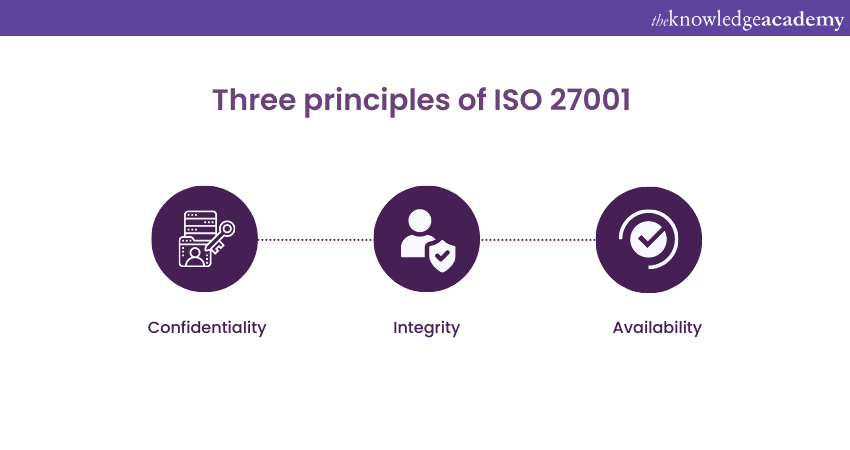
There are three principles of ISO 27001, the standard for Information Security. Implementing these principles can help use an ISMS effectively to reduce security-related incidents. Apart from this, it can also curb the level of impact during a security breach. The three underlying principles of ISO 27001 are Confidentiality, Integrity and Availability, iso 27001 requirements dictate the ISO 27001 guidelines. Here‘s a detailed explanation of these principles:
a) Confidentiality: The first and foremost principle of ISO 27001 is keeping information confidential. It doesn't matter if it is the organisation's information or if it is of the clients and partners; it should remain confidential.
b) Integrity: The second principle is about maintaining the integrity of the organisation's data. Whether stored in a secure place or moved around, it must be ensured that no one can change or alter it. Changes should be made only with proper authorisations, and a backup must be created and maintained for the original data.
c) Availability: The third principle is ensuring access to the data to the right person. If an authorised person wants access to data, it should be readily available to them. Apart from this, it is also about securing and preventing access from unauthorised personnel.
What is Information Security Management Systems (ISMS), and why is it necessary?
The ISMS is a set of best procedures and techniques for managing sensitive information. An effective ISMS can prevent security breaches in advance, mitigating the risks and assuring business continuity.
Why is it necessary
Implementing ISMS can have a lot of benefits for an organisation. Let's learn why using ISMS is crucial for an organisation:
a) Compliance requirements: Government and public bodies regularly update existing laws and make new ones, making it difficult for companies to comply with them. Regarding the laws and regulations of information security, ISO 27001 covers almost everything. Hence, you can easily achieve compliance by implementing this ISO standard.
b) Gain a competitive edge: Imagine a situation where you have created the product and offered it at a very competitive price but still struggle to beat the competition. Now if you get ISO 27001 certified while your competitors fail to do so, you have gained a huge competitive advantage. As ISO 27001 is a globally recognised standard, acquiring it will make your organisation stand out and gain a competitive advantage.
c) Reduce operating costs: The primary motto of using ISO 27001 is to avoid security breaches in advance. Whether it's a small or large breach, preventing it could save your organisation money and reputation. Above all, implementing ISO 27001 costs only a fraction compared to the costs of a security breach.
d) Structure: Employees in growing companies would have trouble understanding the work structure and procedures. These companies primarily focus on growth and don't give a lot of importance to organising their work structure and training.
By applying ISO 27001, they can overcome these issues effectively. It helps companies to document their key processes and helps employees to learn this vital knowledge. This can save a lot of time and ensure the organisation's knowledge is not lost.
a) Data protection: ISO 27001 can protect essential data like clients' personal information like social security numbers. It can also protect the data of your employees.
b) Protection of intellectual property: From intellectual property like trade secrets and patents to confidential financial information like tax returns, ISO 27001 can secure everything.
c) Prepare organisation for upcoming threats: It can help you prepare and manage security incidents by properly planning and implementing security protocols. So, if a security incident happens, you can be well prepared to handle it.
d) Enhance Information Security: The ISMS policies can restrict access and improve Information Security. It will also ensure business continuity by implementing security measures throughout the organisation.
Signup for our ISO 27001 Lead Implement Training courses and learn everything about the global standard for information security management systems.
Requirements of ISO 27001
The ISO 27001 standard is divided into two parts. The first part comprises 11 clauses from clauses zero to ten. The standard's main part is the first four clauses, from zero to three. It covers the introduction, terms and conditions, references and scope.
The remaining clauses - four to ten, are considered necessary for an organisation to comply with the ISO 27001 standard. These clauses mainly focus on the requirements of the standard.
The second part, known as Annex A, gives guidelines for 93 control objectives and controls. It is not mandatory since it deals with the risk management process and not the requirements.
Necessary requirements
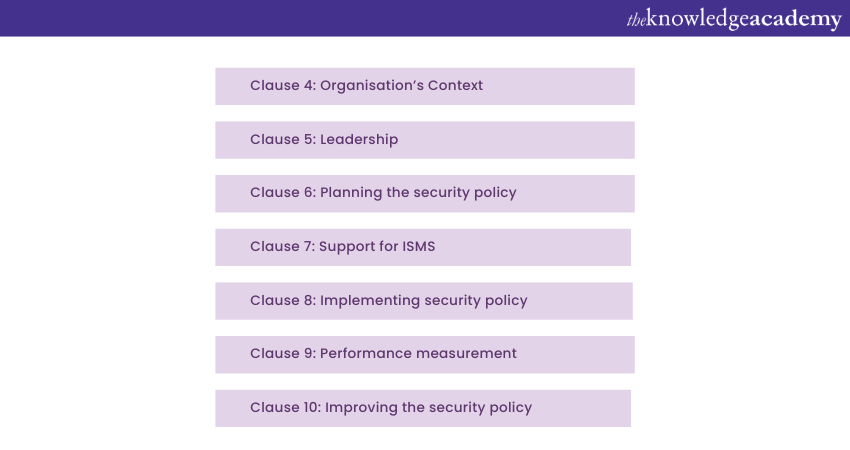
There are many benefits to getting ISO 27001 compliance. In this section, Let's learn about clauses four to ten necessary requirements to achieve ISO 27001 compliance:
a) Clause 4: Before defining the ISMS scope, it is necessary to understand the organisation's context. Identifying any internal and external problems should be done first. These issues can be anything from a simple regulatory issue to a much more severe issue.
b) Clause 5: This clause primarily focuses on the leadership aspect of an organisation. Effective information systems management is dependent on the upper management's commitment. Its objectives should align with the organisation's objectives and should be defined based on the business strategy. These objectives could be anything from supporting the people who contributed to the ISMS to supplying the resources necessary for the ISMS.
Above all, the upper management should develop a high-level protocol for ensuring information security in their organisation. These protocols should be well recorded and circulated across the organisation and to the clients. It is necessary to assign roles and responsibilities to everyone in the organisation to meet the ISO 27001 requirements. This will also help to track the overall performance of the ISMS.
c) Clause 6: It is all about planning the security policy. While planning, you should consider the risks and opportunities involved. The risks can be identified by conducting a risk assessment. It will give a basic idea of how to create a security policy. An organisation's information security goals should rely on risk assessment. These goals should also align with the organisation's primary goals and be informed throughout the company.
When everyone involved is well-informed on these goals, it will be easy to implement and work on these common goals. Based on the risk assessment and the security goals, a risk mitigation plan can be created using the ISO 27001 controls of Annex A .
d) Clause 7: This clause focuses on the support aspect of the ISMS. Proper documentation of information using the ISO 27001 guidelines is essential. Maintaining documentation is necessary to improve the chances of ISMS success. Other key supporting factors include resources, the ability of employees, knowledge and dialogue is also essential.
e) Clause 8: This clause is all about the operations and processes necessary to implement information security. The upper management should focus on the processes like planning, risk assessment and mitigation to implement the organisation's security policy.
f) Clause 9: Perhaps the most important requirement of ISO 27001 is performance evaluation. It involves tracking, evaluation, and analysis of the ISMS. You can evaluate other performance-related metrics with internal audits. The upper management should frequently evaluate the performance of ISMS.
g) Clause 10: Once the performance evaluation is completed, you will have to look at ways to improve it. Anything that hinders the performance of the ISMS should be removed with proper measures. This will further improve the performance and ensure business continuity.
How to fulfil these requirements and achieve ISO 27001 compliance?
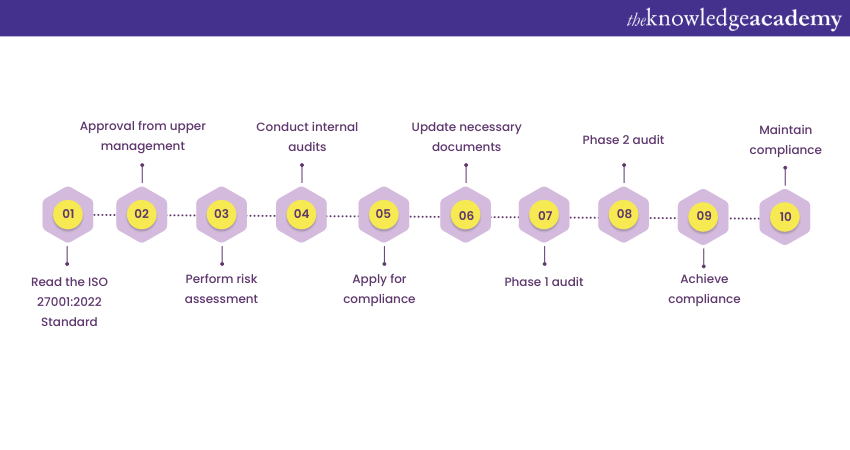
Getting an ISO Certification like ISO 27001 is a big commitment with a lot of work. However, once certified, its benefits can outweigh the efforts. It involves an extensive review of the ISMS used by the organisation and whether it can fulfil the specific requirements of ISO.
The process involves a third-party review done by an authorised Auditor. This Auditor will thoroughly check the ISMS and test whether it can comply with the standard. Based on the assessment, the Auditor will suggest changes that can improve the effectiveness of the ISMS. These suggestions will also help achieve ISO 27001 compliance. Once all the requirements are fulfilled, your organisation will receive ISO 27001 Certification from the authorised body.
Other supporting International Standardisation for Organisation (ISO) standards
ISO 27001 Framework is considered an important Standard among the ISO 27000 Standards. It specifies what is necessary to achieve the Standard but fails to explain how to achieve it. Many frameworks have been developed to overcome this problem and give more guidelines.
There are many supporting Standards available for ISO 27001. These standards capitalise on areas that ISO 27001 doesn’t explain in detail. Some of these Standards are listed below:
a) ISO 27002: It provides recommendations to implement the Annex A controls list. Apart from this, it also provides guidelines on how to apply these controls.
b) ISO 27004: It gives recommendations for the estimation of information security. Plus, it describes how to determine if the ISMS achieved its targets.
c) ISO 27005: It gives suggestions for risk management in information security. It is very similar to ISO 27001 and is considered a proper alternative. It explains how to do a risk assessment and mitigate similar risks.
d) ISO 27017: It gives instructions for information security in cloud-based systems.
e) ISO 27018: It gives suggestions for privacy protection in cloud-based systems.
f) ISO 27031: It gives recommendations for ensuring business continuity for Information and communication technologies. ISO 27031 is a unique Standard connecting information security and business continuity.
Conclusion
We hope you enjoyed reading this blog and understood What is ISO 27001 and why it is important. You would have also learned about the benefits of ISO 27001 and how it can help organisations with information security. Earning an ISO 27001 Certification has a lot of benefits, including improved security, reputation and increased business opportunities.
Signup for our ISO 27001 Certification courses and learn everything about the global standard for information security management systems.
Frequently Asked Questions
Upcoming Health & Safety Resources Batches & Dates
Date
 ISO 27001 Foundation
ISO 27001 Foundation
Mon 13th May 2024
Mon 17th Jun 2024
Mon 8th Jul 2024
Mon 12th Aug 2024
Mon 9th Sep 2024
Mon 14th Oct 2024
Mon 11th Nov 2024
Mon 9th Dec 2024







 Top Rated Course
Top Rated Course



 If you wish to make any changes to your course, please
If you wish to make any changes to your course, please


